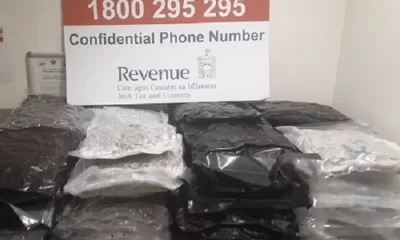Government
Police in Spain Make Largest Ever Seizure of Cannabis

The Guardia Civil, a national police force in Spain, seized more than 32 tons of weed.
Spanish police said over the weekend that they had completed the largest international seizure of cannabis.
The Guardia Civil announced on Saturday that it had dismantled an organization with more than 32 tons of bud stored throughout the country in Toledo, Ciudad Real, Valencia, and Asturias.
The raid was known as the “Jardines operation.”
“The Civil Guard has seized the largest cache of packaged marijuana found so far. The Jardines operation has concluded with the seizure of 32,370.2 kilograms of marijuana buds, the largest seizure of this substance, not only in Spain, but also internationally. Its equivalence in complete plants would be approximately 1,100,000 copies,” the police said.
Or, as the BBC put it, the “weight of the seized plants is roughly equivalent to more than five adult African elephants.”
The police said that through “a complex business network, [the suspects] sent vacuum-packed marijuana throughout the national territory, as well as to Switzerland, Holland, Germany, and Belgium, among other European countries.”
“The twenty detainees – nine men and eleven women between the ages of 20 and 59 – were part of an organization with offices in Toledo, Ciudad Real, Valencia and Asturias, which controlled the entire drug production and distribution process,” the police said in the announcement on Saturday. “The investigation began with an inspection by the Civil Guard of several industrial hemp plantations in Villacañas (Toledo). The main investigated owned a company with which they acquired the seeds. A second transported and planted them. Another company was in charge of the care, maintenance, collection and drying of the specimens.”
“Finally, the initial company was in charge of acquiring the already dried plants with the buds and stored them in two warehouses located in the province of Valencia,” they continued “From there, the detainees processed the genre, separating the buds and vacuum packaging them in different formats to send them both to places in Spanish territory and to European countries, mainly Switzerland, Holland, Germany and Belgium.”
According to police, the subsequent raid took place last month in Ciudad Real, with agents from Toledo ultimately discovering “some 37,000 plants distributed in four greenhouses and in the process of drying.”
“The three people who were at the time of the performance were arrested. In the ship, the Civil Guard also finds four tons of marijuana stings stored in several bags. The destination of all the merchandise was the two warehouses in Valencia,” they explained. “In this last province, the Civil Guard has intervened 30,530 kilos of buds, 20 kilos of pollen -all vacuum packed-, 21,600 plants in the process of drying and 231,200 packs of marijuana buds. Documentation has also been found that accredited the existence of several more plantations, machinery for processing, elaboration and packaging, highlighting above all two machines for the extraction of pollen. In this record 15 people have been arrested.”
“Finally, the third and last phase of the exploitation, has consisted of a new inspection in Asturias. The analysis of the plants that were there has also tested positive for psychoactive. 4,000 plants have been seized and two have been arrested,” the police added.
In June, lawmakers in Spain approved a measure clearing the way for medical cannabis to be available by the end of this year.
Patients with conditions such as cancer, pain, endometriosis, fibromyalgia, and epilepsy, among others, will be able to receive a prescription, with experts estimating that hundreds of thousands of individuals in Spain could potentially take advantage of the treatment.
Source: https://hightimes.com/news/police-in-spain-make-largest-ever-seizure-of-cannabis/
Business
New Mexico cannabis operator fined, loses license for alleged BioTrack fraud

New Mexico regulators fined a cannabis operator nearly $300,000 and revoked its license after the company allegedly created fake reports in the state’s traceability software.
The New Mexico Cannabis Control Division (CCD) accused marijuana manufacturer and retailer Golden Roots of 11 violations, according to Albuquerque Business First.
Golden Roots operates the The Cannabis Revolution Dispensary.
The majority of the violations are related to the Albuquerque company’s improper use of BioTrack, which has been New Mexico’s track-and-trace vendor since 2015.
The CCD alleges Golden Roots reported marijuana production only two months after it had received its vertically integrated license, according to Albuquerque Business First.
Because cannabis takes longer than two months to be cultivated, the CCD was suspicious of the report.
After inspecting the company’s premises, the CCD alleged Golden Roots reported cultivation, transportation and sales in BioTrack but wasn’t able to provide officers who inspected the site evidence that the operator was cultivating cannabis.
In April, the CCD revoked Golden Roots’ license and issued a $10,000 fine, according to the news outlet.
The company requested a hearing, which the regulator scheduled for Sept. 1.
At the hearing, the CCD testified that the company’s dried-cannabis weights in BioTrack were suspicious because they didn’t seem to accurately reflect how much weight marijuana loses as it dries.
Company employees also poorly accounted for why they were making adjustments in the system of up to 24 pounds of cannabis, making comments such as “bad” or “mistake” in the software, Albuquerque Business First reported.
Golden Roots was fined $298,972.05 – the amount regulators allege the company made selling products that weren’t properly accounted for in BioTrack.
The CCD has been cracking down on cannabis operators accused of selling products procured from out-of-state or not grown legally:
- Regulators alleged in August that Albuquerque dispensary Sawmill Sweet Leaf sold out-of-state products and didn’t have a license for extraction.
- Paradise Exotics Distro lost its license in July after regulators alleged the company sold products made in California.
Golden Roots was the first alleged rulebreaker in New Mexico to be asked to pay a large fine.
Source: https://mjbizdaily.com/new-mexico-cannabis-operator-fined-loses-license-for-alleged-biotrack-fraud/
Business
Marijuana companies suing US attorney general in federal prohibition challenge

Four marijuana companies, including a multistate operator, have filed a lawsuit against U.S. Attorney General Merrick Garland in which they allege the federal MJ prohibition under the Controlled Substances Act is no longer constitutional.
According to the complaint, filed Thursday in U.S. District Court in Massachusetts, retailer Canna Provisions, Treevit delivery service CEO Gyasi Sellers, cultivator Wiseacre Farm and MSO Verano Holdings Corp. are all harmed by “the federal government’s unconstitutional ban on cultivating, manufacturing, distributing, or possessing intrastate marijuana.”
Verano is headquartered in Chicago but has operations in Massachusetts; the other three operators are based in Massachusetts.
The lawsuit seeks a ruling that the “Controlled Substances Act is unconstitutional as applied to the intrastate cultivation, manufacture, possession, and distribution of marijuana pursuant to state law.”
The companies want the case to go before the U.S. Supreme Court.
They hired prominent law firm Boies Schiller Flexner to represent them.
The New York-based firm’s principal is David Boies, whose former clients include Microsoft, former presidential candidate Al Gore and Elizabeth Holmes’ disgraced startup Theranos.
Similar challenges to the federal Controlled Substances Act (CSA) have failed.
One such challenge led to a landmark Supreme Court decision in 2005.
In Gonzalez vs. Raich, the highest court in the United States ruled in a 6-3 decision that the commerce clause of the U.S. Constitution gave Congress the power to outlaw marijuana federally, even though state laws allow the cultivation and sale of cannabis.
In the 18 years since that ruling, 23 states and the District of Columbia have legalized adult-use marijuana and the federal government has allowed a multibillion-dollar cannabis industry to thrive.
Since both Congress and the U.S. Department of Justice, currently headed by Garland, have declined to intervene in state-licensed marijuana markets, the key facts that led to the Supreme Court’s 2005 ruling “no longer apply,” Boies said in a statement Thursday.
“The Supreme Court has since made clear that the federal government lacks the authority to regulate purely intrastate commerce,” Boies said.
“Moreover, the facts on which those precedents are based are no longer true.”
Verano President Darren Weiss said in a statement the company is “prepared to bring this case all the way to the Supreme Court in order to align federal law with how Congress has acted for years.”
While the Biden administration’s push to reschedule marijuana would help solve marijuana operators’ federal tax woes, neither rescheduling nor modest Congressional reforms such as the SAFER Banking Act “solve the fundamental issue,” Weiss added.
“The application of the CSA to lawful state-run cannabis business is an unconstitutional overreach on state sovereignty that has led to decades of harm, failed businesses, lost jobs, and unsafe working conditions.”
Business
Alabama to make another attempt Dec. 1 to award medical cannabis licenses

Alabama regulators are targeting Dec. 1 to award the first batch of medical cannabis business licenses after the agency’s first two attempts were scrapped because of scoring errors and litigation.
The first licenses will be awarded to individual cultivators, delivery providers, processors, dispensaries and state testing labs, according to the Alabama Medical Cannabis Commission (AMCC).
Then, on Dec. 12, the AMCC will award licenses for vertically integrated operations, a designation set primarily for multistate operators.
Licenses are expected to be handed out 28 days after they have been awarded, so MMJ production could begin in early January, according to the Alabama Daily News.
That means MMJ products could be available for patients around early March, an AMCC spokesperson told the media outlet.
Regulators initially awarded 21 business licenses in June, only to void them after applicants alleged inconsistencies with how the applications were scored.
Then, in August, the state awarded 24 different licenses – 19 went to June recipients – only to reverse themselves again and scratch those licenses after spurned applicants filed lawsuits.
A state judge dismissed a lawsuit filed by Chicago-based MSO Verano Holdings Corp., but another lawsuit is pending.
Source: https://mjbizdaily.com/alabama-plans-to-award-medical-cannabis-licenses-dec-1/
-

 Business2 years ago
Business2 years agoPot Odor Does Not Justify Probable Cause for Vehicle Searches, Minnesota Court Affirms
-

 Business2 years ago
Business2 years agoNew Mexico cannabis operator fined, loses license for alleged BioTrack fraud
-

 Business2 years ago
Business2 years agoAlabama to make another attempt Dec. 1 to award medical cannabis licenses
-

 Business2 years ago
Business2 years agoWashington State Pays Out $9.4 Million in Refunds Relating to Drug Convictions
-

 Business2 years ago
Business2 years agoMarijuana companies suing US attorney general in federal prohibition challenge
-

 Business2 years ago
Business2 years agoLegal Marijuana Handed A Nothing Burger From NY State
-

 Business2 years ago
Business2 years agoCan Cannabis Help Seasonal Depression
-

 Blogs2 years ago
Blogs2 years agoCannabis Art Is Flourishing On Etsy











